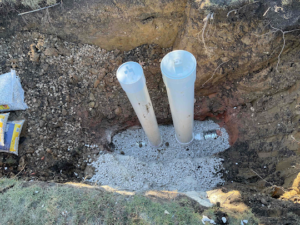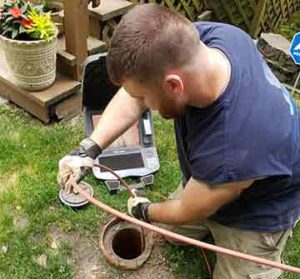Who is responsible for managing – repairing and replacing – the sewer lines on your property when they get damaged? Most property owners never ask this question until they have a sewer line emergency and are looking at thousands of dollars in sewer line replacement costs.

Sewer lines are a critical part of the underlying structures that make a modern home functional. Even though nobody likes to think of sewer lines because of the foul-smelling liquids they carry, you must know what your sewer line responsibilities are as a homeowner.
The sewer line system is jointly owned and managed by homeowners and the city. Each party has the specific parts of the sewer line that they manage. For homeowners, their responsibilities include the upper and lateral sewer lines. The city is responsible for the main sewer lines.
Understanding the structure of the sewer system
Water and waste from the various drains and water-using appliances in your home all eventually find their way to the drain lines that lead from your home to the main sewer line. But to get to this final destination, waste, and water from your home must go through three sections of drain lines, namely:
The upper lateral sewer line
This is the section of pipe that runs from your home and all the way to your property line or the sidewalk. From that point, it attaches to the lower lateral line. The upper lateral line is completely within the boundaries of your property and maintaining it is your sole responsibility.
The lower lateral sewer line
The lower lateral sewer line or private sewer line, (as it is sometimes called) starts at your property line and connects to the city’s main sewer line. It connects to the upper lateral line on one end and the city’s main sewer line on the other end. The lower lateral line is also the homeowner’s responsibility.
The city’s main sewer line
The lower lateral line connects to and empties all its content into the city’s main sewer line. The city’s main sewer line runs under the public street and goes all the way to the city’s sewers. This pipe is unusually large, compared to the other two sections, since it collects and transports all the local sewage and wastewater to the sewers. The city’s main sewer line is the city’s responsibility.
Landlord’s vs the city’s responsibility for damaged sewer line replacement
From the above, it would appear as if responsibility for the maintenance of each section of the sewer system is neatly divided between the city and the property owner, without overlaps. But this is not completely true. Although the city is never responsible for the section that is under your jurisdiction, you may be liable for damage to the city’s main sewer line.
If the drain line from your home gets clogged and somehow causes problems in the city’s main sewer lines, you are responsible for the damage. The city, however, is never responsible for any damage to the sections of the sewer system under your responsibility. As far as the sewer line from your home is concerned, the city’s only responsibility is to connect your drain to the city’s lines.
Preventative sewer line maintenance
Based on this and given the fact that sewer line repairs can be very expensive, it makes sense to take good care of your sewer lines. It is a lot cheaper to implement a program of proactive sewer line maintenance than to try to solve problems retroactively. To get you started on preventative sewer line maintenance, here are some of the critical things to pay attention to.
Know the forbidden items
Contrary to what you think, your sewer lines cannot handle everything you throw at them. Avoid flushing oil, grease, coffee grinds, eggshells, starchy foods (like rice and potato), paint, so-called flushable items, and hard objects down the drain.
Cut tree roots
Tree roots can easily rupture or dislodge your sewer lines. Tree roots penetrating sewer lines in search of water is one of the most common causes of sewer line clogs. Tree roots may also cause sewer line blockages by going over or under the pipes and shifting them out of place.
Update your pipes
The cost of replacing old sewer lines before they create problems is not the same as the cost of replacing them after they have caused problems. The difference in cost is often due to the additional damage that occurs when you let your outdated drain pipes fail before you change them.
Have your sewer lines camera inspected annually
Every year (or every two years at least) have a professional plumber do a thorough camera inspection of the sewer lines. These inspections do not cost a lot of money but they can save you a ton of trouble. The primary goal of these inspections is to catch problems at their early stage. Timely sewer scope inspections will detect things like improper connections that can become huge issues later.
